 Visit to the Iffezheim Hydropower Plant Visit to the Iffezheim Hydropower PlantOn January 30, 2026, experts from EnBW gave a guided tour of the Iffezheim Rhine power plant to KIT students from the Master’s program in Water Science and Engineering and the Bachelor’s program in Civil Engineering. The students had the unique opportunity to visit one of the largest hydroelectric power plants in the region, featuring five turbines with a total capacity of 146 MW. During the visit, they explored the turbine hall, the gates controlling the water level of the Rhine, and a state-of-the-art fish passage measuring 300 m in length. |
 Christmas party 2025 Christmas party 2025On 18.12.2025, we held our Christmas party in a cosy atmosphere in Theodor-Rehbock-Wasserlabor. The party was a great opportunity to look back on the past year with a presentation by Prof Franca and to look forward together to the goals ahead. We enjoyed the festive season with a warm get-together, delicious food and happy moments. |
 Aquatic ecological structural measures in urban areas – concepts, effort, risks Aquatic ecological structural measures in urban areas – concepts, effort, risksSpecialist event of the DWA water management platform, November 26 in Reutlingen Restoring rivers and streams, especially within densely built-up urban sections, poses significant challenges. Comprehensive development concepts are often not feasible due to limited space or complex property conditions. Even smaller structural interventions (such as installing flow deflectors, adding large woody debris, or implementing bank vegetation) must be planned and maintained in accordance with flood-protection requirements and other constraints. At the event, which brought together more than 170 experts, practitioners shared their experiences in planning, implementing, and maintaining such measures in urban environments. Efficient methods for assessing flood neutrality were also presented, alongside discussions of key legal frameworks. The program concluded with an engaging field excursion to ecological restoration projects along the Echaz river in the city of Reutlingen. From KIT-IWU, Dr. Peter Oberle and Dr. Frank Seidel played a central role in shaping the technical content of the program. We extend our thanks to the DWA Landesverband and the Stadtentwässerung Reutlingen (SER) for their excellent organization and the insightful excursion! |
 Steering Group on Water Extremes BW at KIT-IWU Steering Group on Water Extremes BW at KIT-IWUOn November 21, the cross-departmental Steering Group (SG) on Water Extremes met at KIT-IWU. The SG was established by the Ministry of the Environment, Climate, and Energy to develop solutions for dealing with weather extremes such as drought and heavy rainfall. Among other things, it addresses water-sensitive urban development and works on strategies for adapting to climate change. KIT-IWU is represented by Dr. Peter Oberle. Following the meeting, the SG visited the Theodor Rehbock Hydraulics Laboratory to get informed about current research topics and projects. |
 The Law in the Face of Natural Disasters after the 29 October Floods The Law in the Face of Natural Disasters after the 29 October FloodsOn 20-21 November, Mário Franca participated in the International Conference “The Law in the Face of Natural Disasters after the 29 October Floods”, organized by the Faculty of Law at the Universitat de València. It was an interdisciplinary event, including engineers, lawyers, geographers, fiscal specialists, economists, and labor law experts, among others, to discuss the extreme flood event that occurred one year ago in Valencia, the operational first response, and ongoing recovery efforts. See details here. |
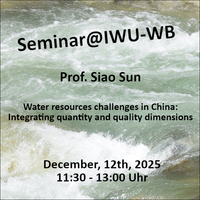 Water resources challenges in China: Integrating quantity and quality dimensions Water resources challenges in China: Integrating quantity and quality dimensionsHuman societies are facing increasing water challenges globally that threaten both the quantity and quality dimensions of freshwater resources. These challenges are particularly acute in rapidly developing countries such as China, where rapid urbanization and agricultural expansion have placed high pressure on surface and groundwater systems. This presentation focuses on China’s multi-faceted water resources challenges, including water scarcity, groundwater depletion, surface water pollution and their linkages to production and consumption through supply chains.
The seminar video is online now! Link to the seminar PDF file |
 Innovative Environmental Research in THE LÄND Innovative Environmental Research in THE LÄNDOn November 4th, 2025 the Workshop highlighted the collaboration between the Karlsruhe Institute of Technology (KIT) and the Landesanstalt für Umwelt Baden-Württemberg (LUBW). The event aimed to facilitate an exchange on current environmental issues and innovative solution approaches. The Workshop comprised subject-specific presentations in the morning and an interactive session in the afternoon, providing space for discussion and the development of ideas for potential joint projects and collaborations. From the Institute for Water and Environment – Hydraulic Engineering and Water Resources Management (IWU-WB), Dr. Andreas Kron, Dr. Frank Seidel and Dr. Ali Pourzangbar contributed inspirational presentations on forward-looking topics in hydraulic and water-related research, including AI-based monitoring and analysis methods. |
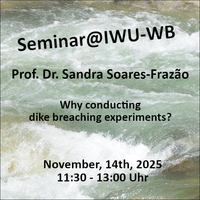 Why conducting dike breaching experiments? Why conducting dike breaching experiments?Climate change increases the probability of dike failure mainly because of raising water levels (overtopping), stronger hydraulic forces (waves, surges, discharges), and weakening dike materials through either excess water (saturation, seepage) or lack of it (drought cracking). In this talk, we will discuss more specifically the requirements for conducting reliable experiments and monitoring techniques based non-intrusive devices such as digital imagery. The discussion will be based on recent experiments conducted at a small scale in the hydraulics laboratory of UCLOuvain-iMMC (Belgium) and at medium scale in the hydraulics laboratory of SPW-MI in Châtelet (Belgium).
The seminar video is online now! Link to the seminar PDF file |
 Building bridges for a sustainable future: KIT–Africa Networking in Stellenbosch Building bridges for a sustainable future: KIT–Africa Networking in StellenboschFrom 6–8 October 2025, a KIT delegation met with leading African universities and research institutions in Stellenbosch, South Africa, for a networking event organized in the scope of the strategic project FA(ST)²Africa. Davide Vanzo was representing our Institute and the Water research at KIT. The three days were packed with inspiring presentations, discussions, round tables and new ideas on how to strengthen collaboration across education, research and innovation — from joint master programmes and staff exchanges to co-created research projects tackling the Water–Food–Energy Nexus, climate resilience and sustainable urban development. The meeting highlighted the strong foundation of existing KIT–Africa partnerships and the shared ambition to expand them further. More info and news in the FA(ST)²Africa official webpage. |
 14th Symposium on River, Coastal and Estuarine Morphodynamics 14th Symposium on River, Coastal and Estuarine MorphodynamicsIn the last week of August, Prof. Mario Franca and Dr. Davide Vanzo had the privilege of attending the 14th Symposium on River, Coastal and Estuarine Morphodynamics (RCEM2025) in Barcelona, hosted by the Universitat Politècnica de Catalunya. The conference brought together leading researchers in hydraulics, geomorphology, and applied mathematics to discuss advances and novelties in morphodynamic processes understanding and modelling. IWU-WB delegation engaged in stimulating discussions and explored new potential collaborations across disciplines. Many thanks to the organizers and fellow attendees for fostering such a vibrant scientific exchange. See you in RCEM 2027-Japan! |
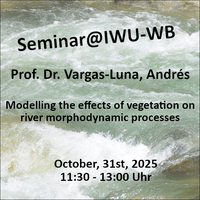 IWU – WB Seminar on vegetation effects on fluvial morphology by Colombian professor IWU – WB Seminar on vegetation effects on fluvial morphology by Colombian professorOn 31st October 2025, Professor Vargas-Luna (Pontificia Universidad Javeriana) will give a seminar on the role of vegetation in morphological processes. His talk will explore how plants influence flow, sediment transport, and river morphology, drawing on fieldwork, laboratory experiments, and numerical models. The presentation will highlight recent advances while addressing the challenges of representing plants in rivers, offering fresh insights for students and researchers interested in fluvial processes and environmental change.
The seminar video is online now! Link to the seminar PDF file |
 Institute excursion Institute excursionOn July 15, 2025, we gathered for our annual outing. We started with a presentation of the Grötzingen fish pass by M. Eng. Martin Gerschitzka, Project Engineer (Engineering office Dr.-Ing. R.-J. Gebler GmbH) . Then, we visited Miguel Pavel’s atelier, where we took our group photo. Afterwards, Mr. Ludwig (Construction company Grötz) presented a construction site for bank erosion control, followed by a weir with fish pass and turbine introduced by Mr. Fleißner, former electrical engineer and co-owner of the hydropower plant. Finally, we observed renaturation works and a weir to be modified. After a short lab visit, we enjoyed a delightful barbecue! Can’t wait for our next expedition ! |
 International Conference on Urban Climate Rotterdam International Conference on Urban Climate RotterdamFrom 7 to 11 July, Rotterdam hosted the International Conference on Urban Climate. The conference brings together researchers, practitioners and policymakers working on improving the quality of urban areas. The theme was "Heritage as an Urban Climate Challenge" and considered the impact of the existing built environment on climate resilience. From IWU-WB, Harro Jongen attended and presented recent work on the impact of the location and timing of energy flux observations at complex urban sites. He also presented a summary of his PhD thesis work entitled: Bridging balances: water and energy in the urban climate. Additionally, he convened a session on extreme precipitation and urban flooding. The last contribution was a poster on attributing evaporation fluxes to the different surfaces in the city, which was awarded the third prize! |
 IWU Pentecost Excursion 2025 IWU Pentecost Excursion 2025From June 10 to June 13, 2025, our students once again had the opportunity to explore various hydraulic engineering and water management facilities as part of the Pentecost excursion. They were able to connect their theoretical knowledge from their studies with valuable practical insights. Accompanied by Victor Dupuis and Yesheng Lu from the Chair of Environmental Fluid Mechanics, as well as Prof. Mário Franca and Daniel Beetz from the Chair of Hydraulic Engineering and Water Resources Management, 17 students experienced impressive days in southern Baden-Württemberg. The technical excursion destinations included the Kleine Kinzig dam, Elz river revitalization, Lake Constance water supply, the Center of Fishery Research of Baden-Württemberg, the Albbruck-Dogern hydropower plant, the Hornberg Basin of the Wehr pumped storage power plant, and the Wolterdingen flood retention basin. The program was rounded off with “non-technical” evening activities such as shared dinners, free time in Überlingen – some used the opportunity to swim in Lake Constance – and a guided tour of the Badische Staatsbrauerei Rothaus brewery. We would especially like to thank all operators and stakeholders who made these exciting visits possible, as well as all sponsors and the Verein zu Förderung der Ausbildung und Forschung in der Hydromechanik e. V. for their generous financial support. |
 Prof. Wantzen recognized by the UNESCO Intergovernmental Hydrological Programme Prof. Wantzen recognized by the UNESCO Intergovernmental Hydrological ProgrammeOn the occasion of the 50th anniversary celebration of the Intergovernmental Hydrological Programme (IHP, PIH) by UNESCO, Karl Matthias Wantzen's work has been recognized as " long-standing contribution to the Intergovernmental Hydrologial Programme". The price trophy was delivered by Mr. Abou Amani (director IHP), Mrs Lidia Brito (UNESCO Assistant Director General for natural sciences) and Prof. Helmut Habersack (BOKU Vienna, Chairperson of the IHP Council). Especially the 12-year UNESCO Chair (Fleuves et Patrimoine / River Culture) work, including concept-development of the River Culture Concept, the editing of the 900 page book "River Culture - life as a dance to the rhythm of the waters" and the engagement for Global South-Global North cooperation on Ecohydrology were recognized. KM Wantzen holds the EUCOR Excellence Chair on Water and Sustainability, which is a joint professorship from the University of Strasbourg and KIT (IWU). During the event, he delivered a keynote on River Culture as an approach to rediscover and facilitate the implementation of ecohydrological NbSs All presentations will soon be online on https://www.unesco.org/en/ihp/50y?hub=68140 |
 GESINUS 2025 GESINUS 2025On 12–13 June, Dr. Jiangtao Yang presented his experimental research on the physical degradation of large wood in rivers at GESINUS 2025, held at Universität der Bundeswehr München, Munich. In his presentation, he demonstrated possible wood debarking patterns under varying conditions such as flow velocity and water depth, and discussed how these parameters influence the debarking rate. During the seminar, it was also a great opportunity to visit the hydraulic laboratory at Universität der Bundeswehr München and learn about their ongoing research on the deposition mechanisms of debris flows and soil seepage processes under freeze–thaw cycles. |
 SimHydro Conference 2025 SimHydro Conference 2025The SimHydro Conference 2025 took place from June 2nd to 4th on the Sophia Tech campus of the Université Côte d'Azur. It addressed the question "Which data for water and models?". Fabian Knepper represented IWU-WB and gave an oral presentation on the results and conclusions from the international survey on the state of QA/QM in flow modeling conducted by the IWU-WB. |
 University of Waterloo Exchange Visit University of Waterloo Exchange VisitIn the first week of June, we had the pleasure of welcoming a delegation from the University of Waterloo (Canada) to our Institute. This visit was part of an ongoing exchange, following our trip to Waterloo in spring 2024. The visit provided an excellent opportunity to showcase KIT-IWU’s research activities and infrastructures to our Canadian colleagues, to further strengthen the long-standing collaboration between our universities, and to reinforce the connection between Baden-Württemberg and Ontario. Most importantly, it served as a platform to lay the groundwork for exciting new partnerships in the water sector. We sincerely thank the KIT International Office for their valuable support and look forward to the next steps in this promising collaboration! |
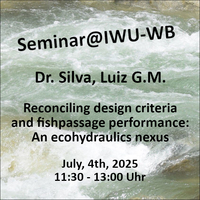 Reconciling design criteria and fishpassage performance: An ecohydraulics nexus Reconciling design criteria and fishpassage performance: An ecohydraulics nexusIn the last three decades, scientists have questioned the efficiency of fishways as a tool to restore riverine connectivity for migratory fish populations globally and devoted efforts to discuss frameworks for future fish passage management and research. In this talk, I aim to discuss several factors that can influence the quantification of attraction efficiency, including challenges correlating hydraulic and fish metrics (e.g. attraction flow and fish movement), potential bias in experimental design, and limitations of methods used.
The seminar video is online now! Link to the seminar PDF file |
 Mario Franca has been appointed Fellow of the International Association for Hydro-Environment Engineering and Research Mario Franca has been appointed Fellow of the International Association for Hydro-Environment Engineering and ResearchWe are pleased to announce that Mario Franca has been appointed Fellow of the International Association for Hydro-Environment Engineering and Research (IAHR, https://www.iahr.org/) by the IAHR Council. The IAHR Fellow Membership aims to recognize members for their outstanding contributions to hydro-environment engineering and research, as well as to the development of IAHR. |
 KIT Open Doors Day KIT Open Doors DayOn 17th May, the KIT Open Doors Day, in a special year in which we celebrate our 200th anniversary, was a great success with over 23,000 visitors. Our institute was present, and all our staff contributed actively to a great day of exchange with community members. From 10 am to 7 pm, we received numerous visitors at both our exhibition locations: a tent at Otto-Ammann Platz and the Theodor Rehbock Hydraulics Laboratory. It was a pleasure to welcome so many members of the public, colleagues, press, personalities, politicians, and, most importantly, children who greatly enjoyed their time with our activities, including paper boat races, plastic detection, and river morphology experiments. Special thanks to the community for visiting our laboratories and exhibition tent! This day was made for you, and we hope everyone enjoyed it and learned more about the relevance of our work to society! |
 European Geoscience Union (EGU) General Assembly 2025 European Geoscience Union (EGU) General Assembly 2025As part of over 18,000 presentations at the European Geoscience Union (EGU) General Assembly 2025 in Vienna, three postdoctoral students from IWU-WB presented their current research and experiments. Their contributions promoted the innovative work of IWU-WB in understanding pollution, sediment and wood transport processes in rivers. Dr. James Lofty presented his work on transport dynamics of plastics in rivers, Dr. Daniel Rebai presented his experiments on turbulence and sediment transport and Dr. Jiangtao Yang presented his work on the abrasion of large wood in rivers. The week was filled with multidisciplinary discussions, posters and presentations, with time to network with both European and International researchers in the evening events.
Abstracts for the conference can be found here: James Lofty: Daniel Rebai: Jiangtao Yang: |
 Visit of IHE Delft students and professors to KIT Visit of IHE Delft students and professors to KITWe had the pleasure of welcoming students and professors from the IHE Delft Institute for Water Education to the Karlsruhe Institute of Technology (KIT) and the Institute for Water and Environment (IWU). The visitors were part of the Erasmus Mundus MSc in Flood Risk Management and the MSc in Water and Sustainable Development programs. Led by professors Leonardo Alfonso and Arlex Sanchez Torres, the group participated in engaging academic discussions and exchanged knowledge with KIT researchers. The visit began with a warm welcome and lunch at the KIT Mensa, followed by a series of academic presentations and interactive sessions. Prof. Mario Franca introduced the activities and structure of KIT and IWU, providing insights into the institute's multidisciplinary approach to water research. This was followed by a presentation by Dr. Ali Pourzangbar, who shared current research and future plans on machine learning applications for flood mapping and risk analysis. A highlight of the day was the guided tour of the Theodor Rehbock Hydraulics Laboratory led by Dr.-Ing. Frank Seidel, where students explored the large-scale hydraulic facilities and ongoing experimental projects. The visit concluded with an informal stroll across the KIT campus. |
 Girls‘ Day at IWU-WB Girls‘ Day at IWU-WBWithin the frame of the Girls’ Day 2025, IWU-WB contributed with the workshop “Design rivers, protect nature, optimize structures – Become a hydraulic engineering expert!” to a versatile program offered by KIT. After a short introductory round to get to know each other, we discovered diverse topics of practical and scientific hydraulic engineering by different physical models in our Theodor-Rehbock-Riverlab. Amongst, we found out how to revitalize degraded channels to give fish a natural habitat and the possibility to find their way through the river, how structures built in rivers affect the morphology, and how to protect a house from floods. A big ‘thank you’ to all participants for taking part, your curiosity and interest! |
 “Jugend forscht” award winners at the IWU (February 24th, 2025) “Jugend forscht” award winners at the IWU (February 24th, 2025)Together with Tobias Beck from the South Württemberg Student Research Center (SFZ), Niklas Ruf and Jana Spiller visited the IWU to present their development of a flood warning system. In Baden-Württemberg, flood warnings are published for all larger bodies of water across the Flood Forecast Center (HVZ) at the LUBW in Karlsruhe. For small streams or catchment areas, however, the installation of additional gauges by municipalities and private residents can help to identify flood risks early and reliably. The innovative "build-your-own" measuring device integrates a radar sensor that can be attached e.g. under bridges and determines water levels and flow rates. Using the LoRaWAN radio protocol, the data is sent to a server in an energy-saving manner, which stores it, evaluates it and, in case of an impending flood, sends a notification to residents or fire departments via a specially developed app and circular email. After a lively discussion and a visit of the Theodor Rehbock hydraulic engineering laboratory, we went on to LUBW for an insight into the federal water gauge network and the forecast models operated by HVZ. |
 Integrating Floating Debris Transport Mechanics into Urban Flood Management Integrating Floating Debris Transport Mechanics into Urban Flood ManagementAs part of his three-week research visit to the Disaster Prevention Research Institute at Kyoto University, Mário Franca gave a seminar on February 25th titled “Integrating Floating Debris Transport Mechanics into Urban Flood Management.” During his stay in Kyoto, he was hosted by Prof. Sameh Kantoush’s research group, where he engaged in scientific exchanges on topics such as sediment bypass tunnels, plastic transport in rivers, and the application of machine learning for flood susceptibility mapping. He also participated in the DPRI Annual Meeting at the Uji Campus. Additionally, he visited the renowned Fluid Mechanics Laboratory, led by Prof. Michio Sanjou, at the Katsura Campus – a lab with a long history of collaboration with KIT, dating back to the work of former director Prof. Iehisa Nezu and the late Prof. Gerhard Jirka. |
 Visit to the New Water Work in Mörscher Forest Visit to the New Water Work in Mörscher ForestAs part of the Water Distribution Systems course in the Winter Semester, on 12th February 2025, we organized an excursion for students to explore the new Water Work infrastructures (built in 2022) operated by Stadtwerke Karlsruhe in Mörscher Forest. The visit provided insights into the water supply process, covering key components such as groundwater resources, reservoirs, and elevated water tanks that ensure stable distribution. Students learned about advanced filtration techniques, including iron and manganese removal systems, regulated-pressure tanks, valves and maintenance progress. The excursion also featured an overview of the pumping systems that regulate water pressure and flow, along with automated monitoring and control mechanisms. Another special highlight of the visit was the impressive light show in the area of the pumping station, which artistically illustrated the system’s functionality. We extend our sincere appreciation to Dr. Nina Rind for her guidance and engaging discussions throughout the trip. |
 New power plant cavern in Forbach New power plant cavern in ForbachThe ENBW is expanding the lower stage of the pumped storage power plant in Forbach at the Schwarzenbachtalsperre with a new power plant cavern. This doubles the storage volume to 400 thousand m³ and enables the temporary storage of 460 MWh. The new pump turbines are scheduled to go into operation in 2028. Many thanks to the power plant manager Ulrich Rost for the special permission to inspect the ongoing tunneling work and to Ms. Ruth Siamos for the exciting tour underground! |
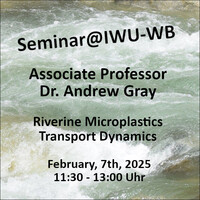 Riverine Microplastics Transport Dynamics Riverine Microplastics Transport DynamicsGlobally, rivers have been found to contain high concentrations of microplastics and are also the major conveyors of microplastic pollution to the ocean. This has engendered an increased focus on microplastic sources, transport, and fate in riverine systems. But how should we design microplastic monitoring plans for rivers if our goal is to quantify concentration, character, and flux?
The seminar video is online now! Link to the seminar PDF file |
 Christmas party 2024 Christmas party 2024On 18.12.2024, we held our Christmas party in a cosy atmosphere in Theodor-Rehbock-Wasserlabor. The party was a great opportunity to look back on the past year with a presentation by Prof Franca and to look forward together to the goals ahead. We enjoyed the festive season with a warm get-together, delicious food and happy moments. |
 "Der Schlüssel für ein verbessertes Hochwassermanagement liegt bei den Kommunen“ - Interview with Peter Oberle - Campus-Report on 2024, 11, 26th "Der Schlüssel für ein verbessertes Hochwassermanagement liegt bei den Kommunen“ - Interview with Peter Oberle - Campus-Report on 2024, 11, 26thIn 2021, the flood hit the Ahr Valley and killed 135 people. In 2022, a third of the country in Pakistan was flooded. More than 15,000 people lost their lives. The south of Brazil was affected at the beginning of 2024. There, entire city districts sank into the raging floods. Hundreds drowned. Finally, in October, the east of Spain was hit: tens of thousands of buildings were damaged and thousands lost their livelihoods. Due to climate change, catastrophic floods have become a terrible norm around the world. So it's high time to take the danger seriously and prepare for it. The hydraulic engineer Peter Oberle has been researching how flood risks can be assessed as realistically as possible at the Karlsruhe Institute of Technology for over twenty years. He is convinced that the state government in Baden-Württemberg is taking the danger very seriously. Unfortunately, this is not always the case at the local level. Link to the interview |
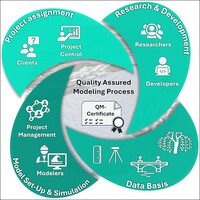 Survey on Quality Assurance and Management in Flow Modeling Survey on Quality Assurance and Management in Flow ModelingAs part of our research on quality assurance and management in the context of numerical flow modeling, in cooperation with the German Association for Water, Wastewater and Waste (DWA) Working Group WW-1.7, we are currently conducting an international survey. Further information and the link to the survey can be found on the project page. We invite you to participate in the survey! Link to the project page |
 Construction Competition 2024 – Visit to Turbine 5 of the Power Plant Iffezheim Construction Competition 2024 – Visit to Turbine 5 of the Power Plant IffezheimAt the invitation of EnBW, the winning group of this year's construction competition was able to visit Machine 5 of the Power Plant Iffezheim on Friday, November 15, 2024, which is currently under revision. The opportunity to see the Kaplan turbine with a runner diameter of 6.8 meters up close, and to hear detailed explanations about the operation and maintenance of the plant, provided them with a profound understanding of the complexity involved in such facilities. It's not every day that one gets to witness the inner workings of a power plant, and this experience surely left a lasting impact on the students. |
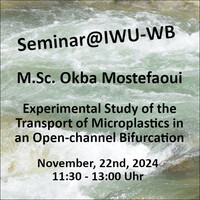 Experimental Study of the Transport of Microplastics in an Open-channel Bifurcation Experimental Study of the Transport of Microplastics in an Open-channel BifurcationMany end-of-life plastic products, particularly microplastic waste, manage to evade treatment and recovery systems end up in numerous aquatic environments. Urban areas are the main source of microplastic generation and pollution, with particles resulting from the fragmentation of plastic packaging, the abrasion of tyres on roads or shedding from synthetic clothing on washing machine drums. The thesis's objective is to investigate the plastic microparticle transport mechanisms in a simplified system representative of a combined storm overflow—a bifurcation flow—using an experimental approach.
The seminar video is online now Link to the seminar PDF file |
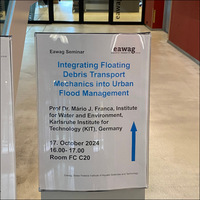 EAWAG seminar by Mário Franca EAWAG seminar by Mário FrancaOn 18 October, Mário Franca gave a seminar on “Integrating Floating Debris Transport Mechanics into Urban Flood Management“, at the EAWAG, the Swiss Federal Institute of Aquatic Science and Technology , in Dübendorf. In his presentation, Mário shared share insights from IWU-WB research, including results on the transport of plastics in rivers, the inception of motion of large debris during floods, and the inception of motion and transport of urban litter caused by pluvial floods. These findings ultimately contribute to better management strategies for urban floodwaters and mitigation of the environmental impacts of plastic pollution.
See the presentation video here Link to the seminar |
 Conference „Vitale Gewässer 2024“, Friedrichshafen Conference „Vitale Gewässer 2024“, FriedrichshafenOn October 8th, 2024, Christin Kannen presented the results of her dissertation on deep pool as fish habitat at the Vitale Gewässer conference in Baden-Württemberg. She showed practical insights and application tips for the almost 300 participants from engineering companies, state administration and other public bodies who are committed to revitalization of rivers in BW. |
 The lecture, "Help! The Flood is Coming! – Dealing with Flood Risks", by Dr. Peter Oberle, was presented in the "Brain Bites" series hosted by the KIT Center for Climate and Environment and TRIANGEL Transfer | Culture | Space The lecture, "Help! The Flood is Coming! – Dealing with Flood Risks", by Dr. Peter Oberle, was presented in the "Brain Bites" series hosted by the KIT Center for Climate and Environment and TRIANGEL Transfer | Culture | SpaceOne of the early press releases following the devastating flood in the Ahr Valley in 2021 stated: “Such an event could not have been predicted!” But is that really true? Historical flood markers along our rivers suggest otherwise. If we have improved knowledge about flood risks, why do we still experience billions in damages and even fatalities, as seen in the Neckar catchment area and Bavaria in June 2024? In his lecture, Dr.-Ing. Peter Oberle explored the possibilities and limitations of sustainable flood protection and precautionary measures. Link to the presentation |
 5th BAW-Workshop, Vienna 5th BAW-Workshop, ViennaOn 26.-27.09.2024, Frank Seidel and Daniel Beetz represented IWU-WB at the Workshop for Model Design, Measurement Techniques and Analysis Methods in Experimental Hydraulics, organized by the Federal Waterways Engineering and Research Institute (BAW) and hosted by the BOKU University, Vienna. Daniel Beetz gave a talk about practical experiences and theoretical backgrounds on Surface-PIV technique, and Frank Seidel contributed to the session about tips and tricks in hydraulics labs. They enjoyed the open and honest discussions about issues and achievements in the daily work of labs all over the German-speaking region. Another highlight was a tour through the new hydraulics lab of the BOKU University, enabling model discharges up to 10 m³/s and 1:1 real-scale experiments |
 23rd YP Meeting of German-speaking Institutes for Hydraulic Engineering 23rd YP Meeting of German-speaking Institutes for Hydraulic EngineeringOn 11.-13.09.2024, Katharina Stickl and Daniel Beetz represented IWU-WB at the 23rd Meeting of Young Professionals of German-speaking Institutes for Hydraulic Engineering and Water Resources Management which was hosted by the Institute for Water Management and Eco-Technologies at Magdeburg-Stendal University of Applied Sciences this year. After a welcome barbecue and lab tour on the first evening, the second day provided versatile insights into the work of other YP’s during different talks and gave space for inspiring discussions. Katharina Stickl contributed a talk about Investigations on the low water corridor at the Rhine and Daniel Beetz about Surface flow pattern and bed morphology interaction in the vicinity of hydraulic structures. On the third day, the meeting ended by an excursion to the Pretzien Weir and the Magdeburg Waterway Intersection. We would like to thank this year’s organizing committee for the great meeting and all participants for the motivating and enriching discussions. |
 Research on the transport of plastics in rivers Research on the transport of plastics in riversOur research on the transport of plastics in rivers was mentioned in the newsletter 2-2024 from the KIT Climate and Environment Center (KIT-ZKU). |
 12th International Conference on Fluvial Hydraulics 12th International Conference on Fluvial HydraulicsThe 12th International Conference on Fluvial Hydraulics, River Flow 2024, was hosted by Liverpool John Moores University from 2–6 September. Mário J. Franca and Luiz Oliveira represented IWU-WB at the conference. Luiz delivered an oral presentation on the paper titled “Hydrodynamics of an Asymmetrical Compound Channel with Nature-Based Vegetation Distribution”, co-authored by Johannes Janzen, Frederik Folke, Florian Wittmann, Nils P. Huber, Mário J. Franca, and Carlo Gualtieri. Additionally, Mário J. Franca presented orally the paper “Linking Coarse Sediment Morphometry and Transport: Insights from Field Data and Curvature Flow Attrition”, which results from a research collaboration with Alessandro Cattapan, the lead author, alongside Michael McClain and Paolo Paron, from IHE Delft. Before the start of the conference, Mário led a master class titled “Mechanics of Plastic Transport in Rivers”, in collaboration with Kryss Waldschlager (Wageningen University and Research) and Daniel Valero (Imperial College London). |
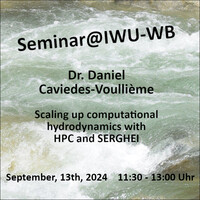 Scaling-up computational hydrodynamics with HPC and SERGHEI Scaling-up computational hydrodynamics with HPC and SERGHEIPhysically-based hydrological models can be understood as an upscaling exercise of hydrodynamic numerical models. The latter have experienced great development in the past two decades, which together with the accelerated growth of computational power, now enable to tackle catchment and even regional scale hydrological modelling based on such tools.
The seminar video is online now Link to the seminar PDF file |
 Institute excursion Institute excursionOn July 23, 2024, we gathered for our annual summer excursion. We embarked on a delightful bike ride through the Oberwald, eventually arriving at Wasserwerk Oberwald, the historic water distribution plant of Karlsruhe. After an enlightening tour and our customary group photo, we continued our journey to the Städtsche Galerie. There, we immersed ourselves in the captivating art exposition, Hydromedia, where international artists showcased experimental artistic methods to raise awareness about water usage, management, and its ecological value. Returning to the lab, we concluded this intense and fulfilling day with a relaxing barbecue. We are already looking forward to our next excursion! |
 Hydroelectric power plant excursion Hydroelectric power plant excursionWe were lucky with the weather on yesterday's student excursion to 2 small hydroelectric power plants as part of the lecture on hydropower engineering. The "Sägemühle" at the river Enz (2 Francis turbines, 1 hydroelectric screw) was extensively modernized and expanded a few years ago by the owner (Mr. Dieter Heilig). Besides the increase of efficiency resp. output, the focus was on improving the ecological conditions. Just before the onward journey to the Upper Neckar, heavy rainfall began, but was replaced by glorious sunshine just in time for our arrival. At the Horb-Mühlen plant (1 Kaplan tube turbine, 1 hydroelectric screw), Mr. Frank Bürkle (E-Werk Stengle) answered questions regarding hydraulic and technical aspects, including the implemented horizontal rake (fish protection) and also gave insights into electricity marketing, network operation and control technology. |
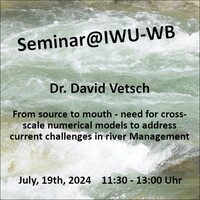 From source to mouth - need for cross-scale numerical models to address current challenges in river management From source to mouth - need for cross-scale numerical models to address current challenges in river managementRestoring continuity and connectivity along rivers is essential for river ecosystems and biodiversity. The speaker will take you on a short journey along a river from its source to its mouth and demonstrate the relevance of various research projects and involved numerical modelling using a number of recent examples.
The seminar video is online now Link to the seminar PDF file |
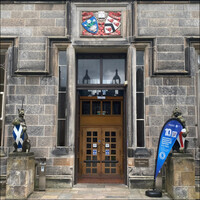 10th International Symposium on Environmental Hydraulics 2024 10th International Symposium on Environmental Hydraulics 2024The 10th International Symposium on Environmental Hydraulics 2024 was organized by the University of Aberdeen, Scotland, 25 – 26 June. Mario Franca presented orally the paper “On the turbulence nature of vegetated compound channels”, with Luiz Oliveira as first author, and co-authored by Johannes Janzen, Frederik Folke, Florian Wittmann, Nils P. Huber and Carlo Gualtieri. In this, results from the project “The hydraulics of four moments in the life of a floodplain forest” were presented, a collaboration between IWU-KIT, the University of Naples Federico II, in Naples, Italy, the Institute of Floodplain Ecology from KIT, the Federal University of Mato Grosso do Sul, in Campo Grande, Brazil, and the Federal Waterways Engineering and Research Institute (BAW), Germany. On the day before the conference, Mario Franca and Olivier Eiff from IWU invited to participate in a workshop on Very Large Scale Motions in open-channel flows. More details here |
 10th IAHR International Symposium on Hydraulic Structures 10th IAHR International Symposium on Hydraulic StructuresFrom June 17th to June 19th, the 10th IAHR International Symposium on Hydraulic Structures took place in Zürich. Hydraulic structures are and will be a vital part of the infrastructure for human beings as they provide safe irrigation and water supply, protection against natural hazards, energy generation, and many other highly needed services. Given the current global challenges including water scarcity, abundance in the form of floods, need for clean and affordable energy and environmental issues related to watercourses as biodiversity hotspots, hydraulic structures will remain very relevant in the future. This was demonstrated by more than 180 Participants from all continents taking part, Frank Seidel represented the IWU-WB. |
 Bauwettbewerb 2024 Bauwettbewerb 2024On June 12th, the traditional Bauwettbewerb (building competition) took place in cooperation with the IWU-WB. In this year's competition, teams of three to six people had to design and build an inlet and outlet structure for a hydrokinetic turbine. The aim was to achieve the highest possible energy yield. The five groups' designs were examined and evaluated under the critical eyes of the audience. The “Wingman” design was able to prevail. The innovation: In this design, “wings” unfolded as a result of the flow and thus directed more water through the turbine. The winners will visit the turbine in the Iffezheim Rhine power plant at the invitation of EnBW. |
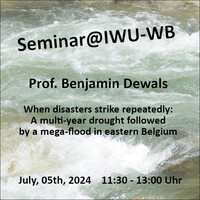 When disasters strike repeatedly: A multi-year drought followed by a mega-flood in eastern Belgium When disasters strike repeatedly: A multi-year drought followed by a mega-flood in eastern BelgiumIn July 2021, parts of Germany, Belgium, the Netherlands and Luxembourg were hit by catastrophic flooding caused by the Bernd low-pressure system. In Belgium, the most affected catchment (the Vesdre River) had experienced repeated summer droughts in the four years (2017-2020) preceding the flood. This seminar will provide an overview of how a rare hydro-meteorological event combined with unfavourable hydrological conditions in the catchment and a lack of risk awareness and preparedness, which was plausibly exacerbated by the preceding prolonged drought.
The seminar video is online now Link to the seminar PDF file |
 8th IAHR Europe Congress 2024 Lisbon 8th IAHR Europe Congress 2024 LisbonThe 8th IAHR Europe Congress was held in LNEC, Lisbon, between 4th – 6th June and counted with more than 400 attendees. Tim Jakobs presented his paper “Experimental Investigations of Thin Layer Surface Runoff on Natural Grassland”, co-authored by Peter Oberle and Mário Franca, and the presentation “Prevalence and physical properties of Urban Flood Drifters (UFDs) in extreme floods” given by Arnau Bayon corresponds to a paper co-authored by Daniel Valero and Mário Franca. Mário Franca presided the Gerhard Jirka Award for Young Researchers that awards the best presentation given by a Young Professional during the biennial IAHR Europe Division Congress. |
 Inaugural meeting of the Institute for Water and Environment (IWU) Inaugural meeting of the Institute for Water and Environment (IWU)The new Institute for Water and Environment (IWU) initiated its activities in January 2024. It was created as a merger of the "Institute of Water and River Basin Management" (IWG) and the "Institute for Hydromechanics" (IfH). The occasion was celebrated on 17th May 2024 with the participation of all IWU employees in the laboratory building of the former Institute for Hydromechanics. |
 IWU visit at University of Waterloo IWU visit at University of WaterlooLast week, a delegation of IWU composed by Mário Franca, Olivier Eiff, Davide Vanzo and Christof Gromke, visited the University of Waterloo to foster for future collaborations in the water sector. The visit included joint meetings, field visits, a Water Talk given by Mário Franca at the Water Institute and the participation in the Graduate Research on Water Technology and Hydraulics (GROWTH) Symposium where graduate students presented and discussed their work. The Water Talk by Mário Franca by can be found here. |
 Thesis of Christin Kannen Thesis of Christin KannenChristin Kannen defended her doctoral thesis last Friday, April 19, 2024. After years of excellent scientific work, she was awarded her doctorate for her thesis on “Hydromorphology of ecological deep pool habitats”. Christin's work has made an important contribution to the state of the art in the field of ecohydraulics. Congratulations to Dr.-Ing. Christin Kannen! We are already looking forward to the next big project she will be embarking on. |
 Third international Conference on Monitoring for Enhanced Hydropower Lifetime Third international Conference on Monitoring for Enhanced Hydropower LifetimeThe conference focused on recent cutting edge geoscientific and technical works undertaken in the western Caucasus within the DAMAST and DAMAST-Transfer projects (2019-2024) funded by the German Federal Ministry of Education and Research BMBF. The DAMAST researchers from TSU, GTU, EIFER, Piewak & Partner, GHHD, GEORISK and KIT have been working on topics such as induced seismicity and reactivation of existing faults under the current stress field, risk mitigation, petrophysical analysis of rocks, sediment formation and transport in the reservoir and the regional deformation as well as the deformation of the Enguri High Arch dam as a response to variable water levels in the reservoir. The IWU was represented by Stephan Hilgert and Andreas Kron. Following the conference, in which representatives of various ministries from Georgia, the German embassy in Georgia and the BMBF took part, the participants were able to take a two-day field trip to see the Enguri high dam and the project area with the measuring installations. |
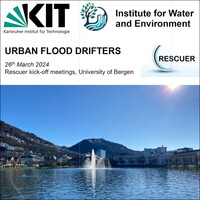 MSCA RESCUER Project MSCA RESCUER ProjectOn 26 March 2024, Mário Franca was invited to give a presentation in the Kick-off meeting of the MSCA RESCUER project to which the IWU is an Associated Partner. He presented the main results of two recent publications on Urban Flood Drifters, an essential element to be considered in flood management. More details can be found on the here and here. Link to the presentation page |
 10th Water Dialogue - Current issues regarding dams on 21.03.2024 10th Water Dialogue - Current issues regarding dams on 21.03.2024This specialist event organized by the Water Management Association B.W. in cooperation with the KIT (Institute for Water and Environment; Institute for Soil and Rock Mechanics) was very well received. Droughts and water shortages will also present us with major challenges here in Germany in the future. Weirs, dams and dykes play a decisive role in retaining and storing water ("sponge landscape"). Current regulations (e.g. DIN 19700, DWA-M 500) on the risk management of dam structures with regard to inspection and incidents as well as the consideration of operational aspects in the context of the in-depth inspection (VU) were discussed. A further contribution dealt with technical procedures for the maintenance of dams and dykes and highlighted their synergies with the need for maintenance for flood protection reasons and ecological concerns. |
 Visit of universities in Kenya and in Uganda Visit of universities in Kenya and in UgandaBetween 19th and 23rd February 2024, with our colleague Andreas Fink (IMK-TRO), and by invitation of the Baden-Württemberg Stiftung, Mário Franca visited universities in Kenya (Nairobi and Kenyatta) and in Uganda (Makerere and Kampala). We had excellent and promising discussions on research and education collaboration. It was the occasion to meet a former PhD student of the institute, Patrick Murigi, now lecturer at the University of Kenyatta. |
 Visit of the Iffezheim hydropower plant Visit of the Iffezheim hydropower plantOn February 2nd, 2024, students from the Master's program Water Science and Engineering and Bachelor's program in Civil Engineering visited the Iffezheim Rhein power plant for a four-hour tour. Under the expert guidance of EnBW, the students visited the automatic control room, the machine room in which the turbines and generators are installed, the fishway and the weir. The tour was a success as the students learned about the state-of-the-art technology used to operate the power plant and the importance of protecting the environment and fish populations. |
 Modeling Approaches to Environmental Flows Modeling Approaches to Environmental FlowsOn the 20th December 2024, Mario Franca lectured to the students of the University of Gadjah Mada (Indonesia) on Modeling Approaches to Environmental Flows. The hosts were Prof. Agus Maryono, PhD alumni from KIT, and Dr. Adhy Kurniawan, former PhD colleague of Mario. The lecture can be found here: https://www.researchgate.net/publication/376713986_Modelling_approaches_to_environmental_flows |
 Christmas party 2023 Christmas party 2023On December 14th, 2023, we held our Christmas celebration in a cozy atmosphere at Theodor Rehbock Water Laboratory. The party was a great opportunity to look back on the past year and look forward to the challenges ahead together. We celebrated the festive season with a warm get-together, delicious food and happy moments. |
 Visit from the President of the LUBW, Dr. Ulrich Maurer at KIT Visit from the President of the LUBW, Dr. Ulrich Maurer at KITAs part of his visit to KIT, the President of the Landesanstalt für Umwelt Baden-Württemberg (LUBW), Dr. Ulrich Maurer, at the IWG informed about current topics in water research. After a general presentation of the water research at KIT by Mario Franca, he, Erwin Zehe and Stephan Fuchs presented the current work and topics of their IWG-departments. |
 Flood risk Baden-Württemberg - Are we prepared? Flood risk Baden-Württemberg - Are we prepared?At the invitation of the Lions Club Karlsruhe-Baden, Dr. Peter Oberle on December 7th in the Schlosshotel Karlsruhe the current flood strategy of the state of BW. The flood disaster of 2021 showed that the current design values for protective measures need to be reconsidered and that the intensities of historical events must be used as a basis, especially for alarm and operational planning. The results of a simulation study (in cooperation with Hydron mbH) for the Neckar Valley are presented, in which the precipitation from the 2021 flood was projected onto the catchment area there. The discharges in the Neckar Valley are comparable to the historic flood of 1824, with devastating consequences for the industrial sites located in the river valley. The BW state government provides comprehensive information (including hazard maps, forecasts) and tools in order to be prepared for such extreme events. The lecture ends with an appeal to the municipalities and each individual to take advantage of the offers and face this challenge. |
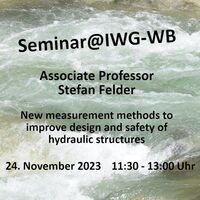 New measurement methods to improve design and safety of hydraulic structures New measurement methods to improve design and safety of hydraulic structuresHydraulic structures, such as dams fulfill many societal functions including water supply, flood mitigation and generation of hydropower. Their safety is paramount and a failure can be catastrophic. The design of hydraulic structures must therefore be conducted with the highest technical standards using state-of-the-art measurement approaches.
The seminar video is online now Link to the seminar PDF file |
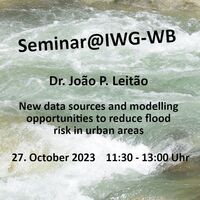 New data sources and modelling opportunities to reduce flood risk in urban areas New data sources and modelling opportunities to reduce flood risk in urban areasThe Seminar aims at presenting aspects relevant for flood data collection and fast modelling of flood events.
The seminar video is online now Link to the seminar PDF file |
 DAMAST-Transfer Qualification Program & DAAD SDG-Caucasus workshop Towards Sustainable Sediment Management of catchments and reservoirs Sep 24-28, Potshko Etseri, Georgia DAMAST-Transfer Qualification Program & DAAD SDG-Caucasus workshop Towards Sustainable Sediment Management of catchments and reservoirs Sep 24-28, Potshko Etseri, GeorgiaAs team from the Department of Water and River Management from Karlsruhe Institute of Technology (KIT) together with partners from the Georgian Technical University (GTU) and Tbilisi State University (TSU) we organized a joined workshop with the title “Towards Sustainable Sediment Management of Catchments and Reservoirs”. The workshop took place from 24.09-28.09.2023 in Postko Esteri in direct vicinity to the Enguri Dam. We (Andreas Kron, Stephan Hilgert and Klajdi Sotiri) presented a global perspective on reservoirs in the context of sediment management, State-of-the-Art sediment detection methods, hydrodynamic modeling approaches and we organized a field trip including a bathymetric and seismic surveys on the Enguri reservoir as well as hydrometric measurements at the Enguri River. The workshop took place in the frame of the DAMAST-Transfer project and was supported by the DAAD. Further information about the workshop and the project can be found at https://www.damast-caucasus.de/ |
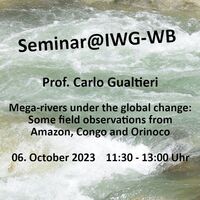 Mega-rivers under the global change: Some field observations from Amazon, Congo and Orinoco Mega-rivers under the global change: Some field observations from Amazon, Congo and Orinoco“Mega-rivers” are defined as those having an average annual discharge much larger than 10000 m³/s. Following this definition, there are 10 mega-rivers on the Earth: Amazon, Congo, Orinoco, Yangtze, Madeira, Negro, Brahmaputra, Japura, Parana and Mississippi.
The seminar video is online now Link to the seminar PDF file |
 Michael Ritzmann celebrated 40 years of service at KIT Michael Ritzmann celebrated 40 years of service at KITIn July 2023, Michael Ritzmann celebrated 40 years of service at KIT. On this occasion, Mário Franca presented him with the certificate of thanks signed by Ministerpräsident Winfried Kretschmann. The entire institute congratulates. |
 40th IAHR World Congress “Rivers – Connecting Mountains and Coasts” 40th IAHR World Congress “Rivers – Connecting Mountains and Coasts”From August 21st - 25th the 40th IAHR World Congress “Rivers – Connecting Mountains and Coasts” took place in Vienna, Austria (IAHR 2023). Researchers from all over the world presented their results to more than 1300 registered attendees. Christin Kannen (Ecological benefits of bridge pier scours), Dr. Daniel Valero (Workshop: Towards more sustainable hydraulic structures), Luiz de Oliveira (Effect of geometric shapes on vegetated lateral cavities | Hydrocomplexity in vegetated lateral cavities) and Tim Jakobs (Novel experimental setup to analyse natural thin layer surface flow) represented the IWG with their contributions. |
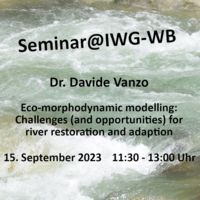 Eco-morphodynamic modelling: Challenges (and opportunities) for river restoration and adaptation Eco-morphodynamic modelling: Challenges (and opportunities) for river restoration and adaptationRiverscapes are highly dynamic systems hosting a plethora of physical, ecological, and biochemical processes. Anthropogenic alterations, such as channelization and hydropower production, together with global warming pose increasing challenges to river scientists and managers for the mitigation of natural hazards but also for the conservation and adaptation of river ecosystems.
The seminar video is online now Link to the seminar PDF file |
 Institute outing Institute outingOn 25.07.2023 the company outgoing of the department Hydraulic Engineering and Water Resources Management took place. First, we went by bike to a spot near the river Rhine called “Belle”. Fortunately the rainy weather could not affect the good mood, so everyone cycled on to the Rhine port steam power plant. Here the hard coal block RDK8 was shown to us, with focus on the inlet and outlet of the cooling water. Since the cooling tower is currently under revision, it was even possible to visit the cooling tower from the inside which was very impressive. Back at the KIT, everyone enjoyed the relaxed barbecue together. |
 Expert authorities visit field laboratory (WiPaD project) Expert authorities visit field laboratory (WiPaD project)Experts from Baden-Württemberg and Bavaria visited the IWG field laboratory in Pfinztal on July 18, 2023 as part of a cross-border exchange on the subject of "flash flood management". The setup, financed by the state of BW, enables a highly detailed analysis of the hydraulic processes on natural slopes during flash floods. The knowledge gained serves to improve 2D numerical flow models for determining flood hazard and risk maps. |
 Hydroelectric power plant excursion Hydroelectric power plant excursionAs part of the lecture on hydropower engineering, a student excursion to 2 small hydroelectric power plants was organized by Dr. Peter Oberle and M.Sc. Tim Jakobs. First, Mr. Dieter Heilig presented the water power plant saw mill at the river Enz (2 Francis turbines). The focus was primarily on the modernization and expansion measures, which were implemented to face ecological requirements. At the second plant situated at the Upper Neckar (1 Kaplanturbine), Mr. Bürkle (E-Werk Stengle) gave the students not only hydraulic issues such as the newly implemented horizontal rake (fish protection) but also insights into electricity marketing, grid operation and innovative control technologies. |
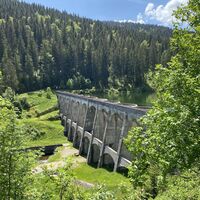 Pentecost Excursion 2023 Pentecost Excursion 2023From 29 May to 1 June, students from KIT participated in the Water Science and Engineering Pfingstexkursion which included visits to the dam and water supply system of Kleine Kinzig, dam and power house of Linach, flood retention basin of Wolterdingen, restoration project of the source of the Danube, water abstraction and treatment plant of Lake Constance, Albbruck-Dogern power plant on the Rhine and Hornberg pump storage scheme (1 GW). Under expert guidance, the students had the opportunity to visit and discuss thoroughly these large scale projects. The excursion was a success as the students learned in detail about all the phases of relevant projects of water technology. More infos about the M.Sc. in Water Sciences and Engineering here |
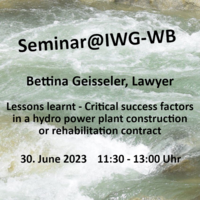 Lessons learnt -Critical success factors in a hydro power plant construction or rehabilitation contract Lessons learnt -Critical success factors in a hydro power plant construction or rehabilitation contractConstructing a hydro power plant (HPP) is a complex project and a challenge for the contractual parties of the construction contract and all other stakeholders concerned. The contract balancing the different interests shall minimize risks, can help to avoid pitfalls and cope with unforeseen situations which might endanger the overall goal.
The seminar video is online now Link to the seminar PDF file |
 Girls'Day 2023 Girls'Day 2023On 27.04.23 M.Sc. Katrin Trautwein and M.Sc. Christin Kannen presented the profession of an hydraulic engineer as part of Girlsday 2023. 15 girls at the age of 9-16 years could get an insight into the profession of a researcher and hydraulic engineer. Katrin presented the project KaWaTech in Vietnam and Christin reported about a research project on hydromorphological modelling of scour processes. Afterwards, we had a tour through our lab and the girls could experiment themselves at our morphodynamic flume facility and see the interaction of water and sediment in a river. |
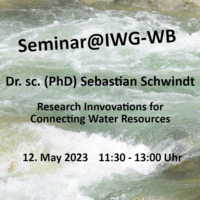 Research Innovations for Connecting Water Resources Research Innovations for Connecting Water ResourcesThis talk explores the connectivity of river networks in a human-built hydro-environment.
The seminar video is online now Link to the seminar PDF file |
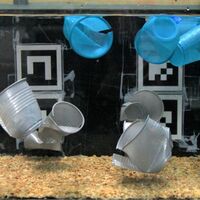 Interview with Dr. Daniel Valero in Deutschlandfunk radio Interview with Dr. Daniel Valero in Deutschlandfunk radioWhy should we study how plastics are transported in rivers? Dr. Daniel Valero (KIT-IWG) answers this question in Deutschlandfunk radio and talks about some results from our recent investigations. |
 DAMAST Transfer Webinar Series DAMAST Transfer Webinar Series1st Webinar: Assessment of sedimentation in Enguri Reservoir
The seminar video is online now. Link to the seminar PDF file |
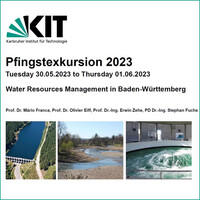 Registration for the Pentecost Excursion 2023 is now open Registration for the Pentecost Excursion 2023 is now openFrom Tuesday, May 30th, 2023 to Thursday, June 1st, 2023, the “Water and Environment” department will be offering an excursion on the subject of “Water Resources Management in Baden-Württemberg”. More information about the program and registration can be found here |
 BAW and KIT organized workshop "Experimental Hydraulics 2023" BAW and KIT organized workshop "Experimental Hydraulics 2023"On the initiative of the Federal Waterways Engineering and Research Institute (BAW), experts in the field of experimental hydraulics have been meeting regularly for international expert workshops since 2015. This year's meeting took place on April 3rd and 4th in Karlsruhe. The organizers were the BAW and the IWG at the Karlsruhe Institute of Technology (KIT). Read the current press release here (in german) |
 Prof. Laurent Schmitt visiting the IWG Prof. Laurent Schmitt visiting the IWGOn March 31, 2023, Prof. Laurent Schmitt from the University of Strasbourg visited the IWG. His research interest lies in the field of river morphology, river revitalization and alluvial geoarchaeology. In this context he participates in many projects along the Rhine on the French side. The visit to the IWG marked the beginning of a planned intensified cooperation with the IWG. In connection with his visit, Prof. Schmitt gave a lecture on the topic "Navigation, hydropower, sediment legacies, functional restoration and transboundary management of the Upper Rhine" in the lecture series of the IWG (Seminar@IWG-WB). |
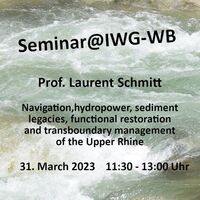 Navigation, hydropower, sediment legacies, functional restoration and transboundary management of the Upper Rhine Navigation, hydropower, sediment legacies, functional restoration and transboundary management of the Upper Rhine |
 DWA working group "Quality Management in the Use of Multidimensional Flow Models" DWA working group "Quality Management in the Use of Multidimensional Flow Models"A new working group was established by DWA called "Quality Management in the Use of Multidimensional Flow Models." A new DWA working group was formed on February 15, 2023, at KIT-IWG, comprising of experts from administration, consulting companies, model developers, and users. Dr. Peter Oberle, a member of the DWA Hydraulics Expert Committee, has been appointed as the spokesperson. The aim of the group is to establish standardized procedures that ensure the qualified use of (2D in particular) flow models in water management practice. |
 Visit of the Iffezheim hydropower plant Visit of the Iffezheim hydropower plantOn February 17th, 2023, students from the Master's program Water Science and Engineering and Bachelor's program in Civil Engineering visited the Iffezheim Rhein power plant for a four-hour tour. Under the expert guidance of EnBW, the students visited the automatic control room, the machine room in which the turbines and generators are installed, the fishway and the weir. The tour was a success as the students learned about the state-of-the-art technology used to operate the power plant and the importance of protecting the environment and fish populations. |
 Completion of the KIT-IWG outdoor laboratory Completion of the KIT-IWG outdoor laboratoryOn the outdoor laboratory, the hydraulic runoff processes of thin layer surface runoff on natural surfaces are analyzed as part of the "WiPaD" project on behalf of the LUBW. Based on these investigations, new insights will be gained for the calculation of heavy rain risk maps. |
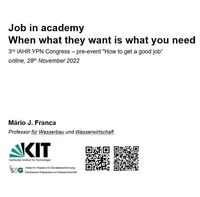 Job in academy. When what they want is what you need Job in academy. When what they want is what you needOn 28th November, Mário Franca participated on a webinar on “How to get a job”, a pre-event from the 3rd IAHR Young Professionals Congress (https://www.iahr.org). He made a short presentation “Job in academy. When what they want is what you need”, which is available under the link below. Link to the newspage |
 Successful commissioning of an innovative water supply system in a remote karst region in Vietnam Successful commissioning of an innovative water supply system in a remote karst region in VietnamWithin the BMBF-funded project KaWaTech Solutions researchers and technicians from KIT-IWG together with KSB AG completed successfully the implementation of a pilot water pumping system based on hydro power and photovoltaic. It secures the water supply for more then 10.000 people in the Dong Van district and in future will be operated by the local water administration. The R&D efforts serve as an initial basis for the implementation of similar systems in water scarce areas worldwide. |
 25 years at KIT! 25 years at KIT!On October 1st, 2022, our colleague Dr. Peter Oberle celebrates his 25th service anniversary. He has headed the "Numerical Analysis in Hydraulic Engineering" department since 2005 and, with his expertise, is an important pillar of the institute. We are pleased to have such a valuable colleague in our ranks, both personally and professionally. Dear Peter, congratulations and we look forward to more successful years! |
 IAHR Baden-Württemberg YPN, 21st annual colloquium IAHR Baden-Württemberg YPN, 21st annual colloquiumThis year annual colloquium of IAHR Baden-Württemberg YPN was held on November 04th 2022 at the Universität Stuttgart. Young scientists and professionals from research institutions within Baden-Württemberg have come and shared their works and visions contribute to “Sustainable Water management: Challenges for the next generation” – this year highlight. Prof. Mário Franca gave his lecture in professional forum, while M.Sc. Dan Trinh’s presentation was one of the two honorable mentions in young professional forum. |
 Blind spots in the monitoring of plastic waste Blind spots in the monitoring of plastic wasteKIT researchers and partners suspect that much more plastic is transported in flowing waters than previously assumed and are developing new modelling approaches. Link to the newspage |
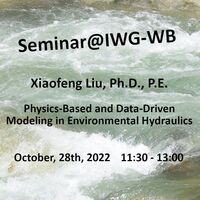 Physics-Based and Data-Driven Modeling in Environmental Hydraulics Physics-Based and Data-Driven Modeling in Environmental Hydraulics |
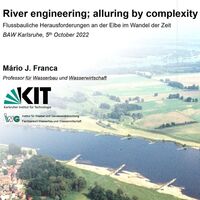 River engineering; alluring by complexity River engineering; alluring by complexityProf. Mário Franca gave the opening lecture “River engineering; alluring by complexity”at the colloquium of the BAW „Flussbauliche Herausforderungen an der Elbe im Wandel der Zeit“. Further informations |
 Conference “Monitoring for High Dam Lifetime" Conference “Monitoring for High Dam Lifetime"Conference “Monitoring for High Dam Lifetime: Reliable Supply of Water and Electricity in times of Decarbonization” , 15.-17.09.2022, Tbilisi (Georgia). The conference highlighted the major results and further aims of the DAMAST project that were reached during the co-operation between georgian and german scientists. During the field trip, representatives of the German embassy and the BMBF were able to inform themselves about the research work on site. |
 Günther Kühn celebrated 40 years of service Günther Kühn celebrated 40 years of serviceOn September 23rd, 2022, Günther Kühn celebrated 40 (!) years of service. On this occasion, Mario Franca presented him with the certificate of thanks signed by Ministerpräsident Winfried Minister Kretschmann. The entire institute congratulates and is happy to have a colleague who is so valuable in human and professional terms in its ranks. |
 Visit of Regierungspräsidentin Sylvia M. Felder (RP Karlsruhe) Visit of Regierungspräsidentin Sylvia M. Felder (RP Karlsruhe)During her visit to KIT on September 5, 2022, Regierungspräsidentin Sylvia M. Felder (RP Karlsruhe) informed herself also about ongoing institutes research projects in the field of floods events. After an introduction of KIT by President Prof. Dr. Holger Hanselka and of Division IV - Natural and Built Environment - by the head Prof. Dr. Johannes Orphal, Dr. Andreas Kron presented the institute with current research topics. Afterwards, M.Sc. Christin Kannen guided the group through the hydraulic lab and explained various model experiments. |
 Joint IWG-VAW workshop on river engineering Joint IWG-VAW workshop on river engineeringOn July 14th, 17 participants from the IWG, the IfH and colleagues from the Laboratory of Hydraulics, Hydrology and Glaciology at the ETH Zürich met for a one-day workshop on river engineering. In 5 technical talks and a tour of the hydraulic laboratories at the KIT, current issues and methods in river engineering were discussed and possible research cooperations were explored. |
 Gesinus-Meeting Gesinus-MeetingOn July 6/7, 2022, after a two-year break from Corona, a Gesinus meeting (GErman-SINoUnsteadySediment transport group) was held again. As always, with presentations of actual Research projects, interesting technical discussions and opportunities for personal exchange.
Photography by Michael Hils/BfG |
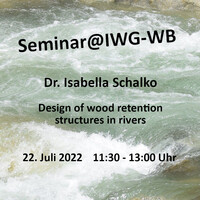 Design of wood retention structures in rivers Design of wood retention structures in riversWood is an integral part of a river ecosystem and can be transported during both small and large floods. To manage wood transport in Alpine rivers, rack structures have been installed to retain wood upstream of endangered settlements or infrastructures.
The seminar video is online now. Link to the seminar PDF file |
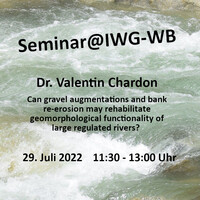 Can gravel augmentations and bank re-erosion may rehabilitate geomorphological functionality of large regulated rivers? Can gravel augmentations and bank re-erosion may rehabilitate geomorphological functionality of large regulated rivers?The case of the Old Rhine River downstream of the Kembs dams (France/Germany).
The seminar video is online now. Link to the seminar PDF file |
 World Congress “From Snow To Sea” World Congress “From Snow To Sea”From June 19th - 24th the 39th IAHR World Congress “From Snow To Sea” will take place in Granada, Spain (IAHR 2022). The International Association for Hydro-Environment Engineering and Research (IAHR), founded in 1935, is a worldwide independent organisation of engineers and water specialists working in fields related to the hydro-environmental sciences and their practical application. Researchers from all over the world present their results to more than 1200 registered attendees. Prof. Dr. Mário Franca, Dr. Daniel Valero (Simulation of a Transient Gravity Current – Comparison of Four RANS Eddy-Viscosity Turbulence Models), Wendy Gonzalez Otero (Numerical Modelling of the Suspended Sediment Transport in a Reservoir under the Influence of Wind and Temperature) and Tim Kerlin (Parameterization of Flow Resistance for the Hydrodynamic Numerical Simulation of Sheetflow) will represent the IWG with their contributions. Link to the website |
 Tour de PhD Tour de PhDAs part of the Tour de PhD, 18 PhD students from Wageningen University came to visit KIT. In the morning, research topics were presented and a discussion was held. Afterwards, guided tours were offered in the Theodor Rehbock Laboratory and in the hydraulic engineering laboratory of the IfH. After lunch the group took a walk across Karlsruhe Castle to the BAW. Here, the BAW laboratories were shown in a guided tour. The day was then concluded with a joint dinner at the Badisches Brauhaus. |
 Girls'Day 2022 Girls'Day 2022Today M.Sc. Katrin Trautwein and M.Sc. Christin Kannen presented the profession of an hydraulic engineer in an online seminar as part of Girlsday 2022. 6 girls at the age of 9-16 years could get an insight into the profession of a researcher and hydraulic engineer. Katrin presented the project KaWaTech in Vietnam and Christin reported about a research project on hydromorphological modelling of scour processes. Link to the newspage |
 The Federal Ministry of Education and Research reports on the joint project DAMAST The Federal Ministry of Education and Research reports on the joint project DAMAST |
 Presentation “Flood risk management didn’t age well“ by Prof. Mário Franca Presentation “Flood risk management didn’t age well“ by Prof. Mário FrancaOn 22 March, Mário Franca did a presentation with the title “Flood risk management didn’t age well“ by invitation of the Laboratory of Hydraulics, Hydrology and Glaciology of ETHZ, in Zurich. Based on an analysis of the unfortunate flood events occurred in July 2021 in Northwestern Germany, and considering the demands which post-Anthropocene will bring in terms of extreme weather events, Mario Franca reflected on which evolution is needed to better evaluate flood hazard. Link to the presentation page |
